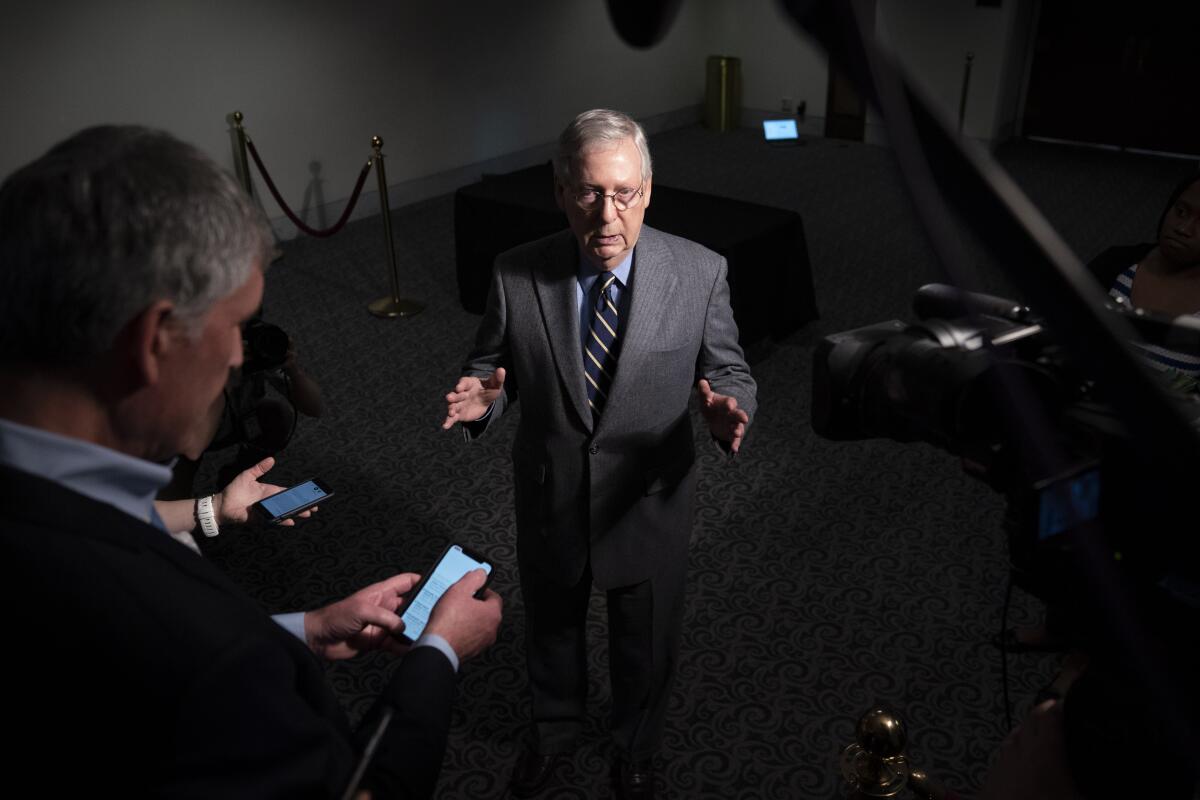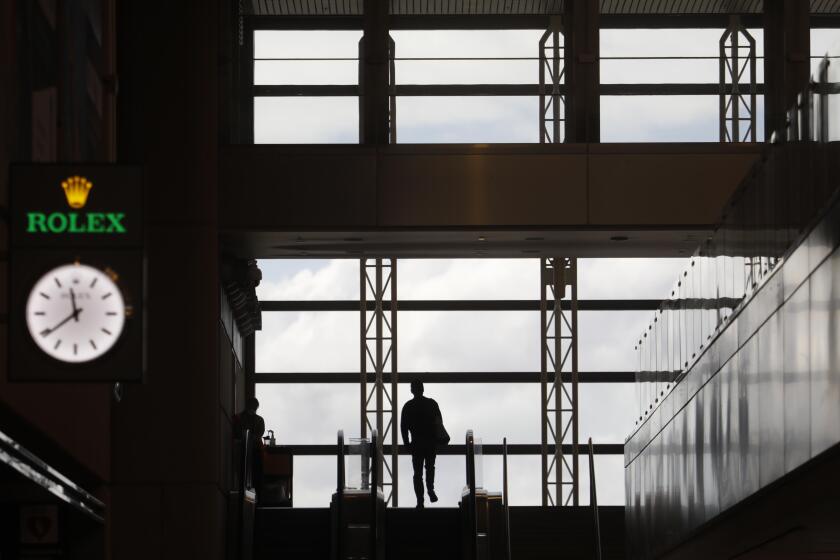Column: Shoveling money out of airplanes looks good to Republicans

Washington — The era of small government is over — and a Republican president is helping to end it.
For more than a century, our two major parties have been defined by their attitudes toward the size and scope of the federal government. Democrats were expansionists; the GOP insisted on limited government, the smaller the better.
But the coronavirus has made almost every politician a free-spending activist, beginning with President Trump. He has promised to use every resource of the federal government not only to counter the epidemic but to make sure the economy recovers.
Airline service in the United States is teetering on the brink of collapse, with near-empty planes and coronavirus outbreaks that have left some air traffic control towers empty.
“We are going to save American workers, and we are going to save them very quickly,” he said Monday. “If you had a viable business in January, we are committed to ensuring that the rescue is there.”
If a Democrat were in the White House, GOP deficit hawks almost certainly would have fought for a smaller, more targeted bill.
When President Obama proposed a $787-billion stimulus to help the economy recover from the Great Recession in 2009, almost every Republican in Congress opposed the plan as too large.
This time, almost every Republican is supporting a $2-trillion stimulus package that includes billions in loans for companies, states and citizens; help for state-run unemployment insurance programs; and direct payments of $1,200 to most adults — a measure that once would have been mocked as shoveling money out of airplanes.
The cost more than doubled in just a few days, making it the biggest economic stimulus package in history.
One reason for the GOP support is that the economic crisis touched off by the pandemic could be worse than the Great Recession, with some forecasts of unemployment soaring to 20% or more.
But another is that we have a Republican president — and he knows that his chance to win reelection will plummet without vigorous action to save the economy.
“Trump decided to go big, and Republicans fell in line,” Geoffrey Kabaservice, who has written a history of the GOP, told me. “It raises a deeper question: Is conservatism separable from Trumpism anymore?”
In that unexpected and very limited sense, we may be lucky that Trump is in the White House at this moment.
He may not know much about crisis management or epidemiology, but he wants to spend whatever it takes to save the economy — and he can command his party to follow.
But then, Trump was never really a fiscal conservative.
When he ran for president, he broke with GOP orthodoxy by promising never to cut Social Security or Medicare, the two biggest federal domestic spending programs.
He promised, implausibly, to balance the federal budget in eight years — but in office, he has never tried to fulfill that pledge.
Instead, the centerpiece of his first term was a $1.5-trillion tax cut that made the federal deficit much deeper — nearly $1trillion last year, before anyone had ever heard of COVID-19.
And he’s always been a fan of government subsidies for business — at least when he was the recipient.
He was the first real estate developer in New York to win a public subsidy for commercial projects under programs initially reserved for improving slum neighborhoods.
In 2016, the New York Times calculated that Trump had received at least $885million in tax breaks, grants and other subsidies for luxury apartments, hotels and office buildings.
When he has listed priority targets for help under the coronavirus rescue package, he has often mentioned the tourism and hospitality industries. He said he didn’t know whether his hotels would be among the beneficiaries.
“We have to work with the airlines. We have to work with the cruise lines,” he said Monday.
But those probably aren’t the right priorities. Airline companies have plenty of access to private capital markets, and several have shown that it’s possible to survive bankruptcy.
Most major cruise lines are foreign owned and employ relatively few U.S. citizens. The largest, Carnival, is incorporated in Panama — although its chairman, Micky Arison, is one of Trump’s friends and advisors.
When the first stimulus packages were proposed this month, there was a flurry of initial resistance from fiscal conservatives in Congress.
Forty GOP House members and eight senators voted against a proposed bill that would require many employers to provide sick leave to their workers. Sen. Ron Johnson of Wisconsin said he worried about “incentivizing people to not show up for work.”
But as the crisis deepened, the only debate was between the two parties, as Democrats pushed to make the package more generous to unemployed workers and to impose stricter oversight for a $500-billion fund for corporations.
“William F. Buckley used to say that conservatism is the politics of reality,” Kabaservice told me. “If you are a realistic conservative, you have to concede that in a national emergency like this, the federal government is the indispensable actor.”
Someday, once the pandemic has waned and the economy has recovered, the GOP’s fiscal conservatives will find a federal deficit ballooned far beyond their fears, and will begin campaigning to shrink it — or blame Democrats for it.
But that’s for later. Now there’s a war to fight — and an election to win.
More to Read
Get the L.A. Times Politics newsletter
Deeply reported insights into legislation, politics and policy from Sacramento, Washington and beyond. In your inbox three times per week.
You may occasionally receive promotional content from the Los Angeles Times.












